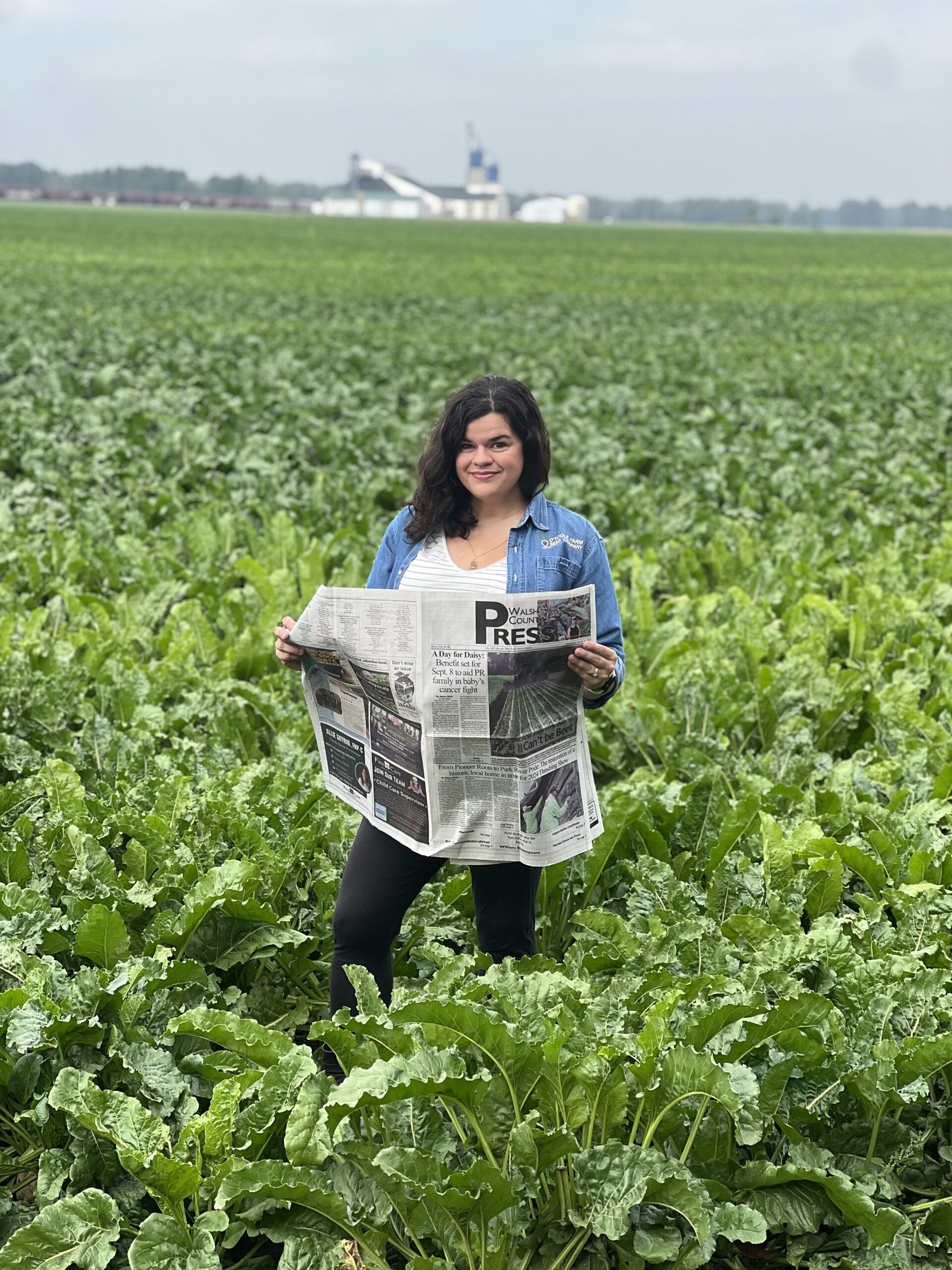As editor of the Walsh County Press newspaper and current president of the North Dakota Newspaper Association (NDNA), Allison Olimb of Crystal, N.D., is living her dream to share the stories of rural America. As a sugar beet farmer along with her husband, parents, and brother, she is also living the dream of her ancestors, Patrick and Margaret O’Toole.
In 1848, the O’Tooles and their five children left their home in Ireland’s County Wicklow with all their belongings and walked 40 miles to the port of New Ross. The family of tenant farmers were among the one million Irish who emigrated to escape the deadly Great Potato Famine between 1845 and 1851. On May 17 of that year, the family boarded the sailing ship Jessie and began the six-week journey to Canada.
In late June of 1848, the O’Tooles arrived in Quebec. They headed west and settled in Ontario where they farmed rented land for the next 30 years. One of their children, Thomas O’Toole and his son Patrick immigrated to Pembina County in northeastern Dakota Territory around 1879 and homesteaded in Crystal where the family remains today.
Patrick’s son T.E. had 11 children and Olimb’s grandfather, Richard O’Toole, is one of them. The family recently celebrated his 90th birthday on the farm.
Olimb was the 6th generation to grow up on the O’Toole family farm and discovered her love of writing at a young age.
“As I got older, I wanted to not only write but to write and make a difference,” she said. “Growing up in a rural farming community showed me that every person has a story to tell and every person’s story is important.”
After graduating from high school, Olimb attended Jamestown College, now known as the University of Jamestown in Jamestown, N.D..
“I majored in Communications with a mass media track and English with a writing concentration,” she said.
Olimb wrote for the University of Jamestown’s college newspaper, The Collegian, during her four years there.
“It was a great experience. As I got to experience journalism a little more, I could see the impact it has. I found it extremely rewarding to tell people’s stories,” she said. “Whether it’s someone running for office or winning an event at the county fair, every story is important to somebody. Whether people are trying to change the world or simply highlight a piece of their world, it’s all important. My late friend said the real journalism starts when you put down the pen and listen to what they have to say.”
After graduating from college, Olimb struggled to find a job in her chosen field and moved back home.
“The country was in a recession and there were no job openings in journalism anywhere,” she said. “One day I picked up a shovel and started cleaning up grain piles and Dad said, ‘you’re hired.’”
Olimb began working with her parents, Brian and Sara O’Toole, and brother Kelly O’Toole, on the family farm which grows sugar beets, wheat, soybeans and edible beans. The family also operates O’Toole Seed, a seed conditioning and sales operation specializing in custom seed cleaning and certified treating for a variety of crops including wheat, soybeans, barley, peas, lentils and edible beans.
“In the meantime, I stopped in at the Walsh County Press in Park River, N.D., to see if they had any opportunities available. I thought it would be a solid way to build up work experience,” Olimb said. “The editor at the time hired me. She was very new and open to suggestions, and we worked very well together. I did most of the writing and she did page layout and handled the business side of things at the newspaper.”
Olimb then moved to Grand Forks, N.D., where she briefly worked as a copy editor for Agweek. Around this time, she met her future husband Frank on a blind date.
“My friend had extra tickets to a monster truck rally and invited both of us to go,” she said. “Frank knew it was a blind date, but I didn’t.”
The pair hit it off and were married in August of 2010.
“After our wedding, we moved back to Crystal to farm with my family. Frank, who is from Oslo/Alvarado, Minn. area, didn’t come from an agriculture background,” Olimb said. “My family threw him right in the deep end of the pool. There was a little bit of a learning curve, but he learned quickly and enjoys the hands-on aspect of all of it. When my dad’s cousin Tom O’Toole retired from the farming partnership, Frank took over doing a lot of the books.”
In addition to becoming an active farmer that year, Olimb also learned that her job at the Walsh County Press was still available.
“They told me it was there when I wanted it and that’s when I got the editor position. I’ve been doing it ever since,” she said. “I grew up in this area and there has always been strong representation in community journalism here. Receiving the editor job was big shoes to fill.”
In the current era of social media, the need for community journalism is greater than ever before, according to Olimb.
“Rural communities need their stories to be told accurately, and with reliable sources as opposed to social media,” she said. “Background and context are what separates high quality journalism from social media. It’s very important to back up what you’re saying, even though it’s not as flashy as a soundbite.”
Olimb feels rural newspapers are thriving in America, although just not in the way people think.
“People like to make generalizations and say newspapers are dying because of something they saw from a city perspective, but that’s not accurate,” she said. “They don’t understand that rural newspapers don’t exist in the same space as WSJ or the New York Times. They tell the stories of a different part of America and the people who live, work, and grow there.”
Small weekly newspapers of North Dakota offer a unique window and perspective into their specific coverage areas and agricultural communities, according to Olimb.
“In some places with no newspaper, there is a news desert and stories aren’t being told,” she said. “Small newspapers increase the opportunities to tell the stories of American agriculture and give a more complete picture of what is happening on a local level versus only a broad, overreaching perspective across a state.”
Olimb joined the NDNA board in 2020 and became president this year.
“It’s an organization that represents all member newspapers across the state and does everything from statewide advertising and lobbying to education and award recognition,” she said.
The association connects all newspapers from those in small one-person shops to large multi-day publications.
“We’re out here making sure public entities are doing their jobs right, keeping their doors open, and being transparent in the context of sunshine laws and open records at all levels. We’re telling the stories that eventually become the history of our communities. The editors and reporters of NDNA pride ourselves on being factual and research-based because our jobs are worth doing and worth doing well.”
Taking pride in jobs well done on the farm are lessons the Olimbs instill daily in their three children: Gary, 12, Olivia, 10, and Lily, 8.
“The kids especially love planting sugar beets and riding along with their dad and uncle. My brother’s five kids and my kids are always fighting over the buddy seat,” Olimb said. “It’s great to watch them growing and learning. Sugar beets are unique and special, not only as a crop, but because of the organization of the industry and the collaboration among growers. We are proud to be part of it.”
Watching their children learn and seeing agriculture through their eyes is the most rewarding part of farming for the Olimbs.
“There’s ups and downs through the decades but watching new generations come up and seeing things from their point of view gives me new energy and perspective. Sometimes we all just get tired, but seeing a little kid’s face light up the first time they see the equipment reminds us why we farm,” Olimb said. “With farming, it’s the community you build that makes it what it is, and we want our kids to see the value in that. It’s been amazing to show my kids that a rural life is a life worth living. We’re the lucky ones.”
Photo credit: Olivia Olimb





Get Social with #MoreToSugar